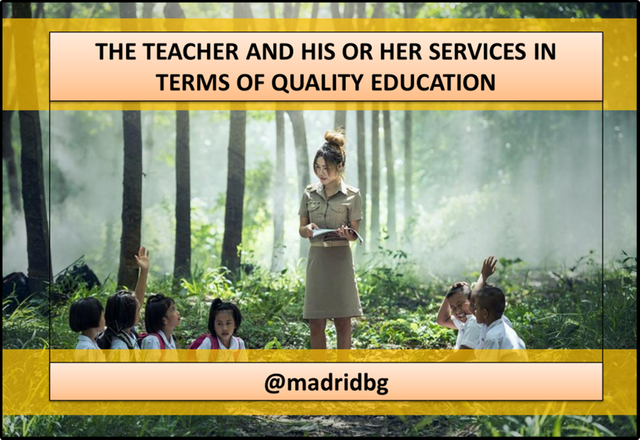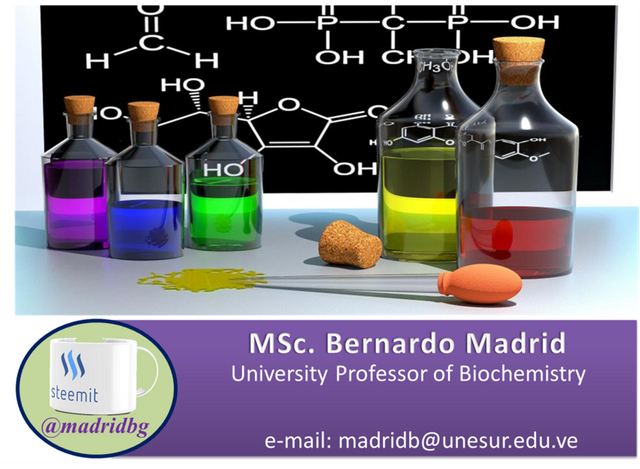THE TEACHER AND HIS OR HER SERVICES IN TERMS OF QUALITY EDUCATION

Authored by @madridbg, via Power Point 2010, using public domain images.
Welcome dear readers of this prestigious platform. The present publication has as premise to give a valid continuity if you want on my previous publications, which refer to:
1. Scientific literacy as an integral teaching process.
2. The science, technology and society (STS) approach addressed from the classroom.
Both publications are oriented to improve the quality of the teaching-learning process under the integration of aspects of scientific, technological, social, economic and environmental interest, as a fundamental variable that allows members of a society to become aware and act individually and collectively in problematic situations of their daily lives.

Fig. 2. The teacher as a means of quality teaching. Author: Alexas_Fotos
Under these premises, the teacher is a determining factor in any curricular transformation, beyond the theoretical foundations of any approach embodied in a curriculum. This is attributable to the fact that the teacher is responsible for the fulfillment of the guidelines set out on paper.
Thus, the teacher is responsible for much of the success and failures of students and future leaders of our nations and under the premise of STS and scientific literacy, any teacher must promote a modeling teaching, establish clear and precise objectives, promote effective and unidirectional communication between teacher and student and generate an autonomy that gives them the possibility to act before the problems.

Fig. 3. Education must be adapted to the needs of our society. Author: Mark Mags
Authors such as Penick (1993), state that in order to achieve intellectual freedom, stimulate creativity and critical thinking it is necessary for the teacher to have the ability to adapt the teaching process according to the needs of society, i.e., the teaching-learning process should be oriented to solve common and real problems of interest to students.
Therefore, it is necessary to develop basic functions that promote a true teaching under the modality of scientific literacy and the STS approach, among which the following stand out:
1. To generate a planned, programmed and evaluated teaching and learning process under clear and precise objectives that allow the approach of the economic, social, environmental, scientific and technological components.
2. Generate an effective and welcoming climate for the student, stimulating creative thinking, conceptual apprehension, effective communication and understanding in the classroom.
3. To develop skills and actions that foster a psycho-pedagogy adapted to the scientific and technological actuality we are assuming.
4. Encourage the development of topics of interest focused on the reality of the students, generating innovative questions oriented to the intellectual questioning of the learner.
5. Encourage scientific and technological usefulness, demonstrating its influences and limitations in the service of society.
Undoubtedly these are specific functions that the teacher must follow from the classroom and he/she is the guarantor of generating quality teaching under the perspectives of the STS approach and scientific literacy.

Fig. 4. The quality of teaching is a function of teachers' commitment. Author: Sasin Tipchai
FINAL CONSIDERATIONS
To break the monotony in the classroom and motivate students to achieve quality learning under the STS approach, it is necessary that the teacher is armed with a set of strategies that allow him/her to act according to the needs of the educational process to be promoted.
These strategies must go beyond traditional teaching, where master classes are the ones that emerge and the transmission of knowledge is given in a linear way and in one direction. On the contrary, we must assume a bidirectional teaching teacher-student, pose real problems and practical work oriented and approached from different areas of knowledge.
In this sense, if you think the socialized information is important, I invite you to leave your contribution in the comments section.
BIBLIOGRAPHIES CONSULTED
[1] Garcias y Col. (2001). Science, Technology and Society: a conceptual approach. Organization of Ibero-American States for Education, Science and Culture (OEI). Article: Online Access
[2] José A. López Cerezo .Science, technology and society. National Council of Science and Technology (CONACYT) - Paraguay.. Article: Online Access
[3] CAJAS, FERNANDO. SCIENTIFIC AND TECHNOLOGICAL LITERACY: THE DIDACTIC TRANSPOSITION OF TECHNOLOGICAL KNOWLEDGE. SCIENCE EDUCATION, 2001, 19 (2), 243-254.. Article: Online Access
[4] Garmendia Mujika, Mikel; Guisasola Aranzabal, Jenaro. Scientific literacy in school contexts: The Zientzia Live! Eureka Journal on Science Education and Outreach, vol. 12, no. 2, 2015, pp. 294-310. Association of Teachers Friends of Science: EUREKA Cadiz, Spain.. Article: Online Access
OF INTEREST
•

Grateful with the community @project.hope and with all the management team of the same one that they motivate us to continue working in a mutual and balanced growth.


Hello @madridbg
Almost four years ago I did a diploma in teaching, there I finished understanding that the job of a teacher is very complex, in addition to having a very big responsibility around the world.
A good teacher helps to create great professionals, that is the reality, and it is not always recognized.